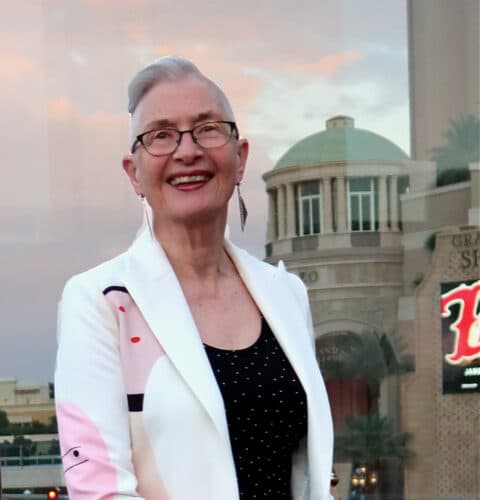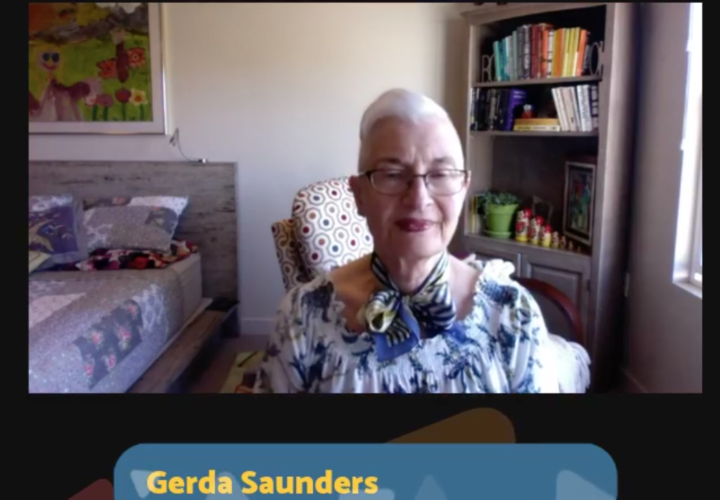Gerda Saunders, a former atomic energy research scientist and math teacher who now writes about living with dementia, discusses vascular dementia.
Before being diagnosed with cerebral microvascular disease, a precursor to vascular dementia, at age 61, Gerda Saunders noticed she was having trouble with her memory. But it wasn’t until she told her family she had baked an Easter casserole the night before, only to discover that she had never baked it, and when she asked her colleagues to introduce themselves twice during an important meeting, that she realized something was very wrong. After going for an MRI, she learned she has lesions on the frontal cortex of her brain, an issue she says has now developed into stage 4 or 5 of dementia.
- The former mathematician says her mathematical abilities were the first to go and now, her husband Peter does their finances
- Saunders experiences spatial disorientation, or confusion about where she is, and mood changes, including anxiety
- She has found that people who have mastered a skill like strong verbal abilities or acting retain that skill longer than others, but once it is lost, the decline happens rapidly
Being Patient spoke to Saunders about what it is like to live with vascular dementia, including early symptoms, her diagnosis, and advice she would give to others living with dementia. (Watch the video interview here.)
Early symptoms of dementia, and how she knew something was wrong
Being Patient: Were you experiencing dementia symptoms before being diagnosed with cerebral microvascular disease?
Being Patient: Was that experience what made you think there could be a larger problem?
Gerda Saunders: Yes, I was aware before that there’s something wrong, but that was a breakthrough moment. Another one was at my work. I was an associate director of gender studies at the University of Utah. I was in the first meeting and my mind just went somewhere else. When it came back, I just didn’t know where we were or what we’d said. I looked at my agenda and it said “Introduction” and I said, “Well, let’s introduce ourselves,” but as I said it, I realized that we had just done that. People were very kind and they said that we all have too much to remember, but that made me even more aware that they had noticed it, and it was very obvious.
Being Patient: You’re a mathematician. Did you lose your abilities related to numbers?
Gerda Saunders: Totally. This has been happening for quite a few years. I used to manage our family budget and later on, when Peter was retired, he mostly started doing it, but I still managed my own part of it. I suddenly could not do a simple subtraction or addition problem because in the middle of the operation, I would switch from subtraction to addition without realizing I was doing that. I would find out the answer was wrong and then discovered that’s what I was doing. Even though I know that’s what I’m doing, I can’t do it right.
Being Patient: Some people suggest their mathematical or cooking abilities are the first things to go because they can no longer do things in order. Is that what happened to you?
Gerda Saunders: You describe it exactly right. For me, I found out as I read more that it’s the executive function that gets destroyed in both Alzheimer’s and vascular dementia and probably some other dementias too at some stage, but that was my first sign: I could not do things that I’d done for many years in order. I just never got to the last step without many, many sidetracks.
Being Patient: Loved ones are often the first to notice something is wrong. Did your husband or children notice these changes?
Gerda Saunders: I think I was the first one aware of it and I mentioned it. When I mentioned these issues, Peter acknowledged that he had seen it. I’d told my children already that I suspected something was wrong. They had seen strange things before, but they thought it was just me being eccentric as I’ve always been. At first, we’d spoken about it as “something wrong with my memory.” Then, people started putting things together. My friends also acknowledged that they could see it.
Related: Heart Attack and Vascular Dementia: How You Can Prevent Both
What it was like to get her vascular dementia diagnosis
Being Patient: How did you first get diagnosed?
Gerda Saunders: I was going to work until I was 65, but by the time I was 62, I could see that I was not functioning very well. I thought that might be a good time to find out. We discussed the benefits of a diagnosis very well in the family. According to our research at that time, there is no cure for any dementia. There are some little things that are thought to slow it down, but I have never heard of anything that reverses it. We thought, what would the point be of a diagnosis? Peter and I decided we would go to our GP. She’s an amazing woman. We talked to her for a long time and described my symptoms. We said, do you think there’s any point in me seeking a diagnosis? She said, yes because you can have memory issues because of a vitamin B deficiency. There are other things too, but she said let’s rule those out and then we can see if it’s not that, then you can decide if you want to go for an MRI.
Being Patient: What did the MRI show?
Gerda Saunders: It said “scattered frontal lobe lesions” of some kind, so in the frontal cortex of the brain. I’m pretty sure that it’s now in other lobes too because things like balance are somewhere around the back of the head and I have issues with that. I also have spatial disorientation so I get very confused in places. It has gradually gotten worse. It’s now a lot worse. Most of the time, when we’re driving somewhere, I have no idea where we are.
Being Patient: Can you describe what you mean by spatial disorientation?
Gerda Saunders: If I’m in any space, I often have to stop and think, where am I? I may know I’m in the nature reserve close to where we live, but I wouldn’t know in which direction I was pointing. I would have to walk up to the river and look at which direction it’s flowing to know which direction I’ve been walking. I walk a lot in the mall because I get lost in outside spaces. In the mall, I’ll also get lost, but I can always find my way back. I can walk outside the store and see it’s Macy’s. Then I can tell Peter, “I’m at Macy’s and I don’t know where I am” or something. Sometimes, I figure out where I am and I can make my way back.
What her vascular dementia symptoms look like day to day
Being Patient: The lesions on the frontal lobe of your brain are often found with frontotemporal dementia (FTD), which usually manifests in behavior changes. Does vascular dementia lead to behavior changes?
Gerda Saunders: Not necessarily, but I have had personality changes and I think it has gotten much more obvious in the last few years. I have uncontrollable emotions. I’ve always been the most controlled person. I don’t say that I never had emotional outbursts, but now, I lose my cool much more often. Sometimes, I know that I’m going into it and if I’m lucky, I can realize this is happening. I tell Peter, “I’m just getting very anxious and out of control,” and then I can sit down and get my bearings. But if I don’t see it coming, it can get really ugly.
I had an awful experience. I’m ashamed of it, even though I know one should not be ashamed. Peter and I were driving along a main street through our area. We were talking about something and as I think many people realize in long relationships, sometimes, you just have a trigger thing that you’ve argued about for 48 years in our case. Something like that happened. I was sitting in the front seat and had my purse with me that had a metal handle. I felt an overwhelming urge to take the metal handle and break out the glass in the front window. I didn’t do that. I realized that I shouldn’t do that and I just jumped out of the car and stood on the side. It was cold and so being out there and being in the cold brought me to and I got back in the car. I said to Peter, “I’m terribly sorry” and I still was completely unfettered, but then we went home and I cried and he was very upset about it. Not angry at me, but very upset at the incident. Things like that happen that are definitely not what I like to think of as myself.
Being Patient: It’s evident you haven’t lost your self-awareness though.
Gerda Saunders: It sometimes works, but the other day, after we were speaking to a particular woman, Peter said to me, “You were really very negative and rude to her,” and as he said it, I thought, I really was. At the time, I had no inkling, but when it was pointed out, I could agree that was the case.
Being Patient: Do you have any strategies for interacting with your grandchildren while living with dementia and helping them to better understand it?
Gerda Saunders: I really don’t have any advice, I just have stories about myself. I find that when the grandkids are here or stay overnight when their parents are on a trip, Peter and I help each other, because I get utterly exhausted and have to lie down for an hour or so. But we absolutely still enjoy them. We live in an apartment now so we have to keep the noise down and that is hard for me. But we have a beautiful outside where we can just walk. If you have the right environment or someone there who can support you, it might be a good idea to say “I just need 10 minutes to get my head together again” and maybe, sit in a chair for 10 minutes or something. Also, I talk to my grandkids about what’s going on with me and I think that helps a lot. We really did it as a family. When I was diagnosed, after a year or so, we decided to have family meetings, like a project. We called it the Saunders Dementia Project. Everybody came and we had a meal. The grandkids were just toddlers then, but they played around and hung out. As we kept on talking through the years, we never sent them away. Sometimes, you can see that we know something might be sensitive and I’d look at the parents and they’d say yes or no about whether we should say it in front of the kids because we don’t know what had happened to them that day or the day before.
Yesterday, my grandson called us and asked if we would come over. He’s six years old. He found out that a dog two or three hours away from him was going to be put down and he was very sad about the dog. As soon as he got home, his mom said, “Oh, the dog is very old and sick” and he said, “But Oma and Opa are also very old and going to die,” so he was very upset. He knows about my dementia. We played with him a bit and then he told us to come into his room. I was sitting in a window seat and he came and sat next to me and fetched a chair for Peter from the kitchen next door. He sat there like that and said, “Who wants to share their feelings first?” We had a little support session going and we spoke to him about our grandparents’ death, our feelings and our feelings about the dog, and then we played with his huge animal dog and it turned into a big game. But those episodes recur. And to the older children, I can speak on a much more intellectual level.
Vascular dementia prognosis and progression
Being Patient: You’ve been living with vascular dementia for seven or eight years. Have you noticed your dementia progressing?
Gerda Saunders: I like to explain the issue of me looking like I don’t have dementia because it’s sort of one of my pet peeves: our society’s image of what someone with dementia looks like. I’ve read about it a lot and one trope is zombies. I cannot argue that people with advanced dementia share the characteristics of zombies. People think of it like that or they think of you as incapable of understanding a conversation. But because of the early diagnoses now, people have years, sometimes, before they show anything biological that can be measured. But they have years and years of decline that progressively gets worse, and the day you get a dementia diagnosis, especially if it’s early, your life is not over. That’s why I’m so grateful that my diagnosis was early because it gave me time to come to terms with my mortality and the mortality of my brain before my body will die.
Being Patient: Have you noticed your memory getting worse since your diagnosis?
Gerda Saunders: Because I’ve been tracking it and I had neuropsychological tests, I know I’m between stage 4 and 5 out of the seven stage scale. The reason I know is because in the middle of three neurological tests, I learned I had lost 20 IQ points—not from the very beginning, but from my IQ when it was previously measured when I was fully functioning. A lot of that went to the mathematical part and a lot of that went to spatial orientation or the ability to remember words a person says to you that you have to repeat. The strange thing about my dementia is that my score on the verbal scale was extremely high compared to my others and that is because when I was young, I learned four languages and English is not my first language. Then, I spent my adult life studying English, teaching English and I’ve always been a voracious reader.
According to my research, people who have developed a particular skill in their lives often retain that skill long after they can’t brush their teeth anymore. I’m thinking about Robin Williams. Most people only found out about his dementia after he committed suicide, but apparently, the year before, he was in a terrible state, according to his wife: awful memory loss, loss of smell, extreme anxiety, just not functioning. And yet, two years before his death, he played in two Broadway shows, had hundreds of lines to remember and managed to remember them all. With his last movie, Night at the Museum, she said it was completely awful and everybody on the set knew. He would try a scene and just couldn’t do it. Everybody supported him and suddenly, he would be able to go on and get into it. But she said after that was over, he came down like a Boeing without landing gear and he just went straight down. My research also shows that happens to people who have developed such a skill. You perform very well for a while, but when you go down, you go down fifty percent faster than people who have not, and usually, it’s related to education. So I can see me picking up on the deterioration.
Read Next: Cardiovascular Disease and Alzheimer’s Share DNA Links




AMAZING!!!!! This has helped me understand so much more about the tiniest of details and I will be able to use it in my day to day life with my special ladies I assist with and my own husband. Thank you so much for starting this “Being Patient “ forum! We need more partners like you out there spreading this good news!
This is so like what has been happening to me. I’ve written scientific articles, several non-fiction books, and novels, and written poetry since the ago of 14 (I am now 79 and diagnosed with Alzheimer’s dementia). I am struggling to complete my last novel, and still writing poetry on various topics.
Hi David, what an impressive writing background! Please know this community celebrates all you’ve accomplished. Sending encouragement as you complete that novel or whatever writing project feels fulfilling and right.